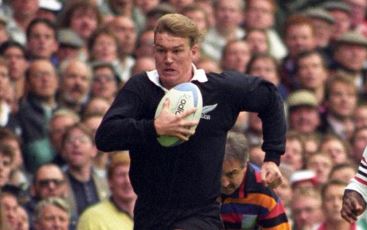Biography
Sir John James Patrick Kirwan, born on December 16, 1964, in Auckland, New Zealand, is a renowned former rugby union and rugby league player, as well as a respected rugby union coach. Standing at 1.92 meters and weighing 92 kilograms, Kirwan made an indelible mark on the sport as a dynamic wing. Beyond his athletic achievements, Kirwan has become a prominent mental health advocate, sharing his personal struggles to help others.
Teams and Years Played
Rugby Union:
- Marist (1983–1994)
- Treviso (1985–1989)
- Thiene (1989–1990)
- NEC (1997–1999)
- Auckland (1983–1994)
Rugby League:
- Auckland Warriors (1995–1996)
International Caps
Rugby Union:
- New Zealand: 63 caps (1984–1994)
- Tries: 35
- Points: 143
Moments of Importance in His Sporting Life
Early Life and Introduction to Rugby John Kirwan grew up in Auckland, where he attended De La Salle College. He was deeply influenced by his family, particularly his grandfather Jack Kirwan, a notable rugby league player. John’s athletic prowess became evident early on, setting the stage for a remarkable career in rugby.
Domestic Rugby Career Kirwan’s domestic career began with Marist Brothers Old Boys RFC and Auckland, where he earned 142 caps. His tenure with Auckland coincided with an era of dominance in the National Provincial Championship (NPC) and the Ranfurly Shield. His performances for Auckland showcased his exceptional speed, agility, and scoring ability.
During his time with Benetton Treviso in Italy (1985–1989), Kirwan won the Italian championship in 1989, further solidifying his reputation as a top-tier player. He later played for Thiene and NEC in Japan, continuing to excel on the field until his retirement in 1999.
International Rugby Career Kirwan’s international career with the New Zealand All Blacks was illustrious. He debuted in 1984 and quickly became known for his scoring prowess, amassing 35 tries over 63 test matches. He was instrumental in New Zealand’s 23-test unbeaten run from 1987 to 1990, which included winning the inaugural Rugby World Cup in 1987. Kirwan’s 10 tries in five tests against Wales and Australia in 1988 are particularly memorable, underscoring his dominance.
One of his most significant contributions was his decision, along with David Kirk, not to join the ‘rebel’ New Zealand Cavaliers tour to apartheid-era South Africa in 1986, a stance that upheld the integrity of New Zealand rugby.
Rugby League Career In 1995, at the age of 30, Kirwan transitioned to rugby league, joining the newly formed Auckland Warriors. He played 35 matches over two seasons, becoming the team’s top try scorer in 1996. Despite the challenges of switching codes, Kirwan’s performance in rugby league was commendable.
Coaching Career After retiring as a player, Kirwan transitioned to coaching, starting with NEC Green Rockets in Japan. He served as an assistant coach for the Auckland Blues and the Italian national team before taking over as head coach of Italy in 2002. Under his guidance, Italy achieved notable victories, but he was dismissed in 2005 after a winless Six Nations campaign.
Kirwan then became the head coach of the Japan national team, leading them to break a 16-year winless streak at the Rugby World Cup with a draw against Canada in 2007. He continued as head coach through the 2011 Rugby World Cup, instilling a sense of “Samurai Spirit” in his players.
In 2012, Kirwan was appointed head coach of the Blues in Super Rugby. Despite initial enthusiasm, the team’s performance did not meet expectations, and he stepped down in 2015 after a challenging season.
Mental Health Advocacy Kirwan has been open about his battle with depression, using his platform to promote mental health awareness. He authored two books, “All Blacks Don’t Cry” and “Stand by Me,” detailing his experiences and advocating for mental health support. He founded the Sir John Kirwan Foundation to help young people understand and manage their mental health and launched the Mentemia app to provide mental wellbeing resources.
Honours and Awards Kirwan’s contributions to rugby and mental health have been widely recognized. In 1989, he was appointed a Member of the Order of the British Empire (MBE) for his services to rugby. He was later appointed an Officer of the New Zealand Order of Merit (ONZM) in 2007 and promoted to Knight Companion (KNZM) in 2012 for his services to mental health and rugby. In 2012, he was also inducted into the New Zealand Sports Hall of Fame.
